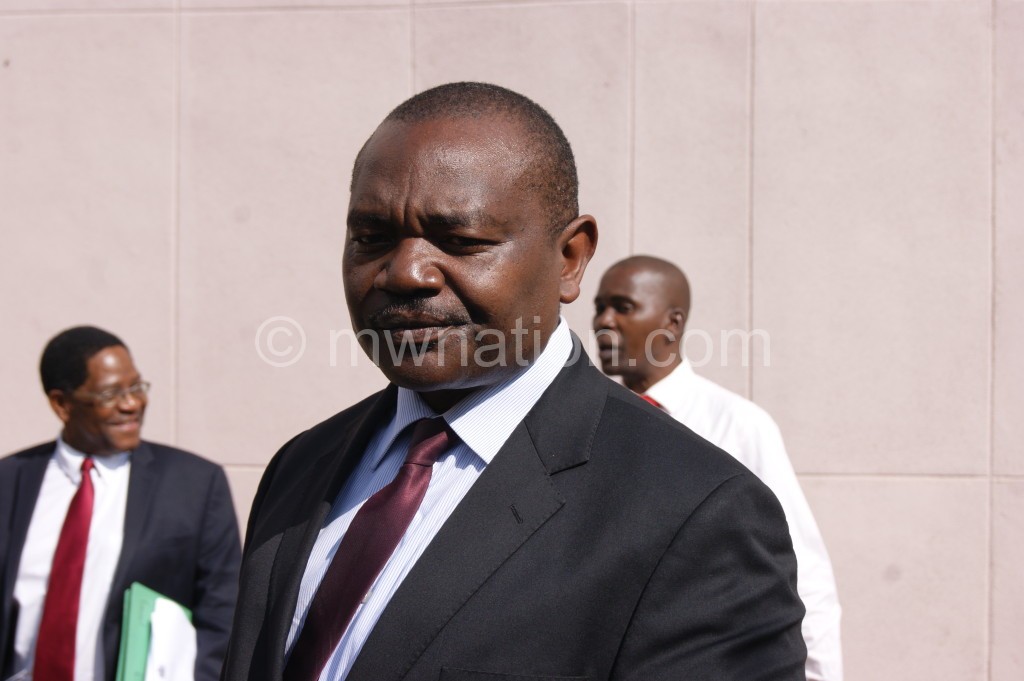Govt appeals K69.5bn order in favour of SA geologist
The Attorney General (AG) has challenged the High Court decision that taxpayers pay South African geologist and mining investor Michael Saner $100 million (about K69.5 billion) as compensation for breach of contract.
If that amount were paid today, it would swallow nearly eight percent of the current K906 billion revised budget ending in June this year.

The amount would also be close to the K75 billion grants that government was expecting from donors for the current fiscal year, which they provided less than half the amount.
In its March 15 2016 judgement, the HighCourt of Malawi found that the Ministry of Natural Resources and Environmental Affairs (as the ministry was called back in 2000) deliberately acted in a manner that denied Saner the renewal of his Exclusive Prospecting Licence (EPL) in defiance of a court order.
In a telephone interview from Lilongwe yesterday, Kaphale said his office has filed an appeal in the Malawi Supreme Court of Appeal against the ruling because it believes some evidence in the case was improperly admitted.
On why government did not defend the case, Kaphale, whose office is the principal legal adviser to government, said he was not the office-bearer in 2010 when an assessment of damages was being conducted; hence, he cannot speak on behalf of the AG’s office about what happened back then.
He said: “I do not have information on what happened in 2010, but government did not attend.”
But Kaphale said he has seen the judgement by High Court Judge Rowland Mbvundula and has since filed the challenge: “I read the court files and I have filed an appeal.”
In his ruling, the judge said the decision was arrived at considering that any difficulties the process of assessing damages suffered were created entirely by the ministry (now known as the Ministry of Natural Resources, Energy and Mining) after it prevented feasibility studies frombeing undertaken.
According to court documents, the assessment of damages, handed in court as an affidavit, was accompanied by a document titled An Independent Competent Person’s Report and Mineral Asset Valuation Report on the Kangankude Hill Property, Malawi of Rift Valley Resources Developments Limited as prepared by a company called Geological and Mine Evaluation Computer Services (Pty) Limited (Gemecs).
The documents further explain that the report was put in evidence and government and the ministry did not challenge as they (government and the ministry) neither filed documents in opposition nor attended (by its legal representation) the hearing of the application pertaining to the damages.
The matter dates back to 2000 when the ministry granted Saner the EPL to mine monazite in Kangankude Mine in Balaka. The EPL was issued on March 15 2000 for an initial period of three years and it was renewable.
Monazite is a rare ore used to make television sets, fertiliser and refining oil.
On November 25 2002,Saner submitted an application to renew his EPL and in compliance with the Mines and Minerals Act, the application was submitted three months prior to the expiry date of the EPL, but the ministry did not respond to Saner’s renewal application and no grounds were given.
The ministry only gave the reasons for non-renewal in May 2003 after inquiry and officers in the ministry told Saner that the EPL would be renewed, but it was not.
However, in May 2003, the ministry issued the mining licence to a Malawian furniture entrepreneur, Tony Patel, although Patel never held an EPL.
Three years later, Patel sold the “rights” to Lynas Corporation Limited, an Australian publicly-listed company, according to court documents.
In May 2004, it was reported in the media that Saner demanded the $100 million from then president Bakili Muluzi and four of his business associates for allegedly grabbing the said EPL.
Our sister paper, Weekend Nation, reported in 2014 that, at that time, Saner estimated the project to have an annual turnover of between $10 million and $48 million. The project was given to Rare Earth thereby contravening the Malawian laws, it was argued.
In a letter dated May 13 2003, government terminated Saner’s EPL despite calls from the British High Commission and the European Investment Bank not to do so “as it would erode investor confidence into future mining venture”.
Studies by the Geological Surveys Department showed that Kangankude Mine has several hundred millions of tons of rare earth ore, which can sustain the business for over 50 years at any projected produce.
Studies dating back to the 1950s and 1960s on the mine indicated that the project has potential to cater for 30 percent of world supply which could reduce the 90 percent monopoly by People’s Republic of China.





